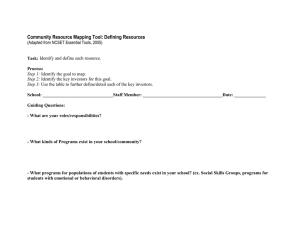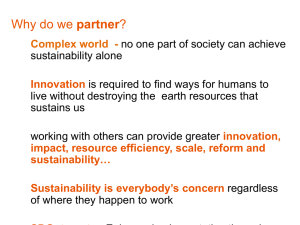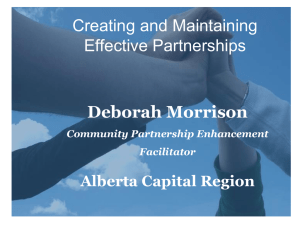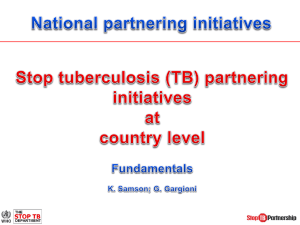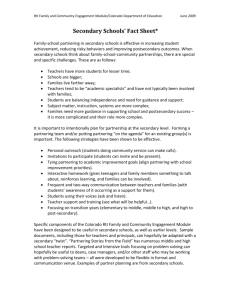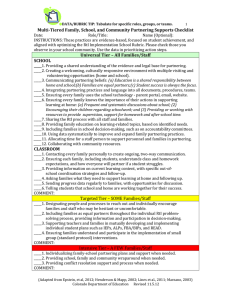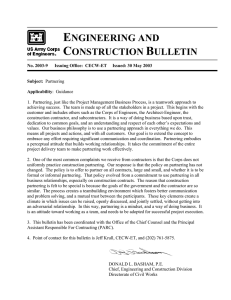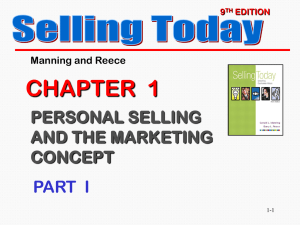Chapter 7 PowerPoint - UCO College of Business
advertisement
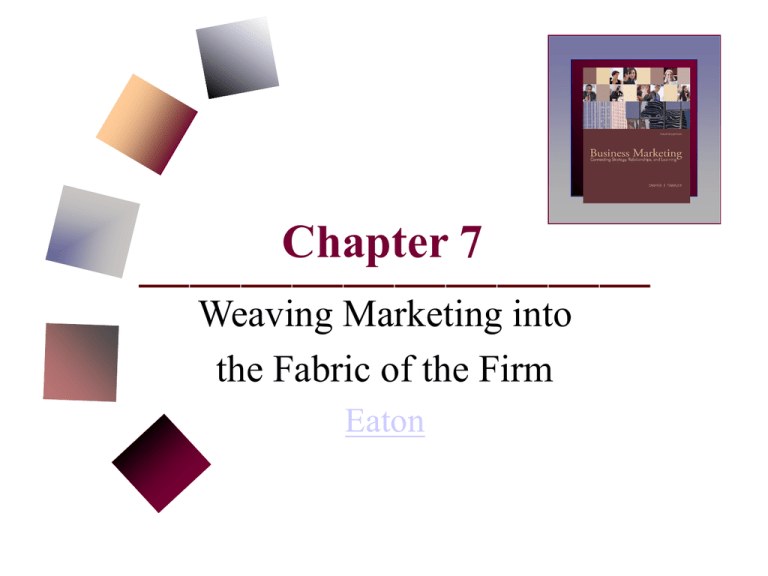
Chapter 7 Weaving Marketing into the Fabric of the Firm Eaton Business Marketing Objectives • Role of Marketing in a learning organizational environment • Internal Partnerships • Partnering Process for Internal Partnerships • Internal Partnership Skills for Marketing Managers The Fabric of the Firm Organizational Culture Collectively held values, ideology, and social processes imbedded in the firm. COMPONENTS OF MARKET ORIENTATION 1. Establish a corporate culture where every employee values their customers 2. Listening to the voice of the customer throughout the entire company 3. Developing superior skills to understand and satisfy customers 7-4 Market Oriented Companies • What is a Market Orientation? – Highest priority on profitable creation and maintenance of superior customer value while considering the interests of other key stakeholders. – Provides norms for behavior regarding development of and responsiveness to market information • How market orientation impacts performance [Ex. 7-1, p. 195] – Market sensing – Spanning processes Classifying Capabilities Ex 7-1, p. 195 Internal Partnering to Create a Market Orientation • Internal partnering carries the voice of the customer • Order Fullfillment Process, Critical Spanning Capability – [Ex. 7-2, p. 198] • Internal vs external partnering [Ex. 7-3, p. 200] – Customer Satisfaction -> Supragoal Order Fulfillment Process Ex. 7-2, p. 198 Internal Partners Marketing Interfaces, Ex. 7-3, p. 200 • Manufacturing – Make to stock – Make to order – Engineer to order • Finance • Purchasing Marketing Interfaces Ex. 7-3, p. 200 Partnerships in Marketing Integrating Marketing Efforts – Clear Strategic Decisions – Personnel Stability – Compensation – Organizational Structure Organizational Structure – Marketing Partners Customer Focused Team structure [Ex. 7-5, p. 206] – Structure and Formal Communication [Ex. 7-6, p. 206; Ex. 7-7, p. 204] Marketing Partners Functional Structure Ex. 7-4, p. 205 Customer-Focused Team Structure Ex. 7-5, p. 206 Communication in a Functional Organ. Structure, Ex. 7-6, p. 206 Marketing Orientation and Organizational Learning Known requisites Organizational Learning Further Defined Organizational Learning and Competitive Advantage - need to learn faster than the competition Competency Trap How Marketing Learns [Ex. 7-7, p. 208] • Cognitive Mapping • Experiments • Learning Laboratories – Scenarios – Case Studies – Strategic Planning • Learning from others • A Commitment to Learning Cognitive Map 1, Ex. 7-8, p. 209 Cognitive Map 2, Ex. 7-8, p. 209 CREATING NEW KNOWLEDGE: THE TOOLS • • • • COGNITIVE MAPPING • Finding links of cause and effect through exploring beliefs and assumptions EXPERIMENTS • Research that tests cognitive maps LEARNING LABORATORIES • A time and space that is set aside for sharing and learning through experiments, scenarios - simulations, models, case studies, strategic planning, and role playing LEARNING FROM OTHERS • Getting knowledge from partners, consultants, seminars, and competitors. 7-19 HOW BUSINESS TO BUSINESS MARKETERS LEARN, Ex. 7-7, p. 208 THE THREE-STEP PROCESS 1 INFORMATION ACQUISITION Marketing Research Sales and Service Feedback Environmental Scanning Competitive Intelligence Accounting Systems Information Systems Experiments Benchmarking Joint Venture Lead Customers Organizational Memory 2 INFORMATION DISSEMINATION To: Marketing Management Senior Management Manufacturing Engineering and R&D Finance 3 SHARED INTERPRETATION Through: Brainstorming Planning Other Processes Exhibit 7-7 7-20 The Learning MarketOriented Individual Important Internal Partnering Skills • Finance and Accounting Skills • Questioning and Listening • Negotiation – Create a Sense of Urgency – What is Negotiated – Be Prepared IMPORTANT INTERNAL PARTNERING SKILLS • FINANCE AND ACCOUNTING SKILLS helps communicate with other managers and make better decisions • QUESTIONING AND LISTENING helps understand needs of others • NEGOTIATION – helps resolve conflicts • ANALYTICAL SKILLS – helps apply meaning to numbers 7-22
